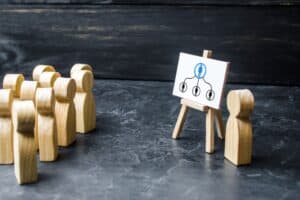In the 1970s, an experiment was conducted on college students, with the assumption that there is a positive correlation between productivity and wearing clean socks.
However, the results showed the complete opposite. The psychologist joked that this meant students could either keep up with their college duties regularly or change their socks every day – but not both.

Another experiment by social psychologist Roy Baumeister was done on hungry students. Upon entering the laboratory, one group was offered freshly baked cookies, while the others were allowed to eat only radishes (bljak).
Of course, it took a lot of self-control for that second group not to take the cookies, especially when the researchers left the lab (and watched the subjects through a secret window).
After properly torturing them, the researchers gave both groups of students an intractable puzzle to solve. There were very interesting results.
The group that was allowed to eat the cookies, as well as the control group that was not given any food, spent as much as 20 minutes solving this puzzle.
On the other hand, the radish group, which had previously demonstrated strong self-discipline and willpower, gave up on the puzzle after only 8 minutes.

Similar experiments produced the same results over and over again.
It turns out that if you go to the mall and give people simple math problems, those who have been shopping longer will give up solving the problem much faster.
Now you may be thinking how interesting it is or, on the other hand, you are totally fed up with this data, but the implications of these experiments can help you become more productive and plan your day much more efficiently.
So what are the implications?
- Our strength THE WILL has its own LIMITED quantity, which is depleted the more we use it.
- We use that power from THE SAME supplies for ALL their duties and tasks.
Many people would say, "Well, I always have enough energy to do my work, but I never have the will to exercise later when I get home."
The thing is, we don't have a separate willpower capacity for work, and a separate capacity for exercise. If you completely use up all your strength at work, of course you won't have enough left to exercise.

It's the same story with the sock experiment we talked about earlier. If you spend two hours doing laundry and ironing, it is much more difficult to devote yourself to writing a term paper afterwards than it would be for a student who started the term paper right away.
It's exactly the same if you wake up in the morning and instead of immediately going to do something related to work, you go to the supermarket to get some supplies.
You will have to make one small decision for each of the things you buy - which consumes your energy, and you yourself know how long shopping can tire a person.
And let's say, some other person, will wake up, immediately get down to work and do a lot of things. That is why it is very important to understand how our willpower works. People who understand this have higher productivity and are much more effective in life than those who don't.

For example, writer Neil Strauss gets automatic food delivery for all his meals, every day. Those who do not understand how our willpower works may say that it is a waste of money, that it is stupid and that he would be better off cooking for himself.
But Strauss would lose a lot more energy if he had to think about what to cook every day, as well as preparing all those meals, and he wouldn't have as much will to devote himself to writing as he has now.
Also, if we look at it purely financially, he would lose thousands of dollars if he failed to improve his writing and publish his books.

So when you wake up the next morning and plan to do your responsibilities, don't start your day by opening Facebook and wasting your energy deciding whether to like this or that.
Don't immediately open an email and answer every little thing before devoting time to the more creative part of the work.
Don't start your day thinking for half an hour about what to have for breakfast.
In fact, it's best to automate as many decisions as possible (even if that means having food delivered to you like Neil Strauss), so you can focus on what's really important.
Every insignificant little thing can little by little drain your will power, and you should devote that power to more important things.
Most people don't realize this and are completely careless about what they spend their willpower on, causing them to be less productive and fail to complete their responsibilities. You now possess that knowledge.

All that is required now is to reflect on your day and see how effectively you obey the principle of will.
Do you start every morning spending time and will on what to have for breakfast? Maybe it's time for a little planning. For example. come up with a weekly meal plan for each day in advance.
Do you leave the more demanding, creative part of your work for the end of your working hours? This is the moment to realize that it must be first on the list of your activities.
Are you trying to do 20 different things at once? Be honest with yourself - this will realistically never happen. Pick one important thing and do it right.
If you are interested in more, look for the book "Willpower" by Roy Baumeister.
Bonus tip: For additional time savings, digitize your business. Digitization enables you easier for clients to find and speeds up the appointment and purchase process. It reduces the number of obligations, because the internet is here to work for you. Learn more at this link.
For more helpful tips, visit our blog.
Source: youtube.com/FightMediocrity









